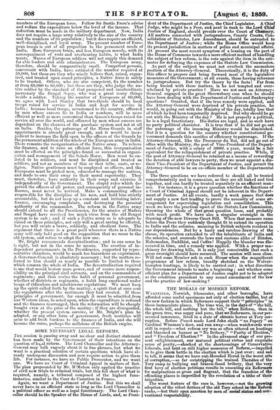SOME NECESSARY LEGAL REFORMS.
THE session is passing away and no clear and distinct statement has been made by the Government of their intentions on the question of legal reform. The Lord Chancellor and the Attorney- 'General may talk vaguely about it in fine phrases, but what we want is a practical solution of certain questions which have al- ready undergone discussion and now require action to give them life. For instance, we have no Public Prosecutor, and we want one. We have no Court of Criminal Appeal in matters of fact. The plan propounded by Mr. M'Mahon only applied the ;practice of civil new trials to criminal trials, but this fell short of what is required, namely, a tribunal composed of the highest func- ,tionaries, similar to the Cour de Cessation in France.
Again, we want a Department of Justice. But this we shall never have in an efficient state so long as the Lord Chancellor is a political officer as well as a legal functionary. The Lord Cha.n- cellor should be the Speaker of the House of Lords, and, as Presi- dent of the Department of Justice, the Chief Legislator. A Chief Judge, who might be a Peer, and next-in rank to the Lord Chief Justice of England, should preside over the Court of Chancery. All matters connected withjurisprudence, County Courts, Con- solidation of Statutes, Law Amendment, should be entrusted to the Department of Justice ; while the Home Office would keep its present jurisdiction in matters of police and municipal affairs. At present the most recent symptom of a leaning on the part of the House of Commons towards a more efficient method of handling the subject of law reform, is the vote against the item in the esti- mates for defraying the expenses of the Statute Law Commission. As part of the subject we must not overlook the anomalous position of the Attorney-General. Theoretically, it is the duty of this officer to prepare and bring forward most of the legislative measures of the Government; at all events, those having reference to jurisprudence. But try the theory by the facts! Far from being busied with these matters, is he not tempted and over- whelmed by private practice ? Have we not seen an Attorney- General engaged in the great Shrewsbury ease when he should have been dealing with the Department of Justice and Bankruptcy questions ? Granted, that if the true remedy were applied, and the Attorney-General were deprived of his private practice, he would, in going out with the Ministry of the day, totally lose that of which he had been temporarily deprived. But why should he go out with the Ministry of the day ? He is not properly a political, he is a legal functionary. His duties are legal, and as such have no party political character. It is true that if he did not go out the patronage of the incoming Ministry would be diminished. But it is a question for the country whether constitutional go- vernment demands this sacrifice of efficiency to patronage. If the Attorney-General, like the Procureur du Roi, did not go out of office with the Ministry, the post of Vice-President of the Depart- ment of Justice, with a salary of 5000/. a year,. would be a fair equivalent for the relinquishment of private practice. While, if the post of Attorney-General be retained as a means of rewarding the devotion of able lawyers to party, then we must appoint a dis- tinct Vice-President of the Department of Justice, and permit the Attorney-General to be an ex-officio member of the Departmental Board.
The three questions we have referred to should all be treated comprehensively and in connexion, as they are all linked and tied together, and can hardly be treated separately in an efficient man- ner. For instance, it is a grave question whether the ?unctions of a Court of Criminal Appeal should not be inherent in the Depart- ment of Justice. At all events, hardly a week passes that doe 'not supply a new fact tending to prove the necessity of some if- rangement for supervising legislation and consolidation. This week we have the practical upset of the Statute Law Commission, throwing the whole of that great question loose, and probably with much profit. We have also a singular oversight in the drawing of the new Divorce Court Bill. When that measure came before the Peers they suddenly thought fit to extend its operation to India and the colonies, meaning to British subjects resident in our dependencies. But by a hasty and careless drawing of the clause, its operation extended to all the inhabitants of India and the colonies, and overrode the laws and customs alike of Hindoo, Mahomedan, Buddhist, and Cairn! Happily the blunder was dis- covered in time, and a remedy was applied. With a proper ma- chinery for drawing bills, it is only just conceivable that such a gross oversight should have occurred. The session will soon close. Will not some Member ask in each House when the magnificent programme of law reform, broadly sketched on the Wolver- hampton hustings, is likely to be carried out ; in what direction the Government intends to make a beginning ; and whether some efficient plan for a Department of Justice ought not to be adopted as the condition precedent to any sound amendment of the law and the practice of law-making ?


























 Previous page
Previous page